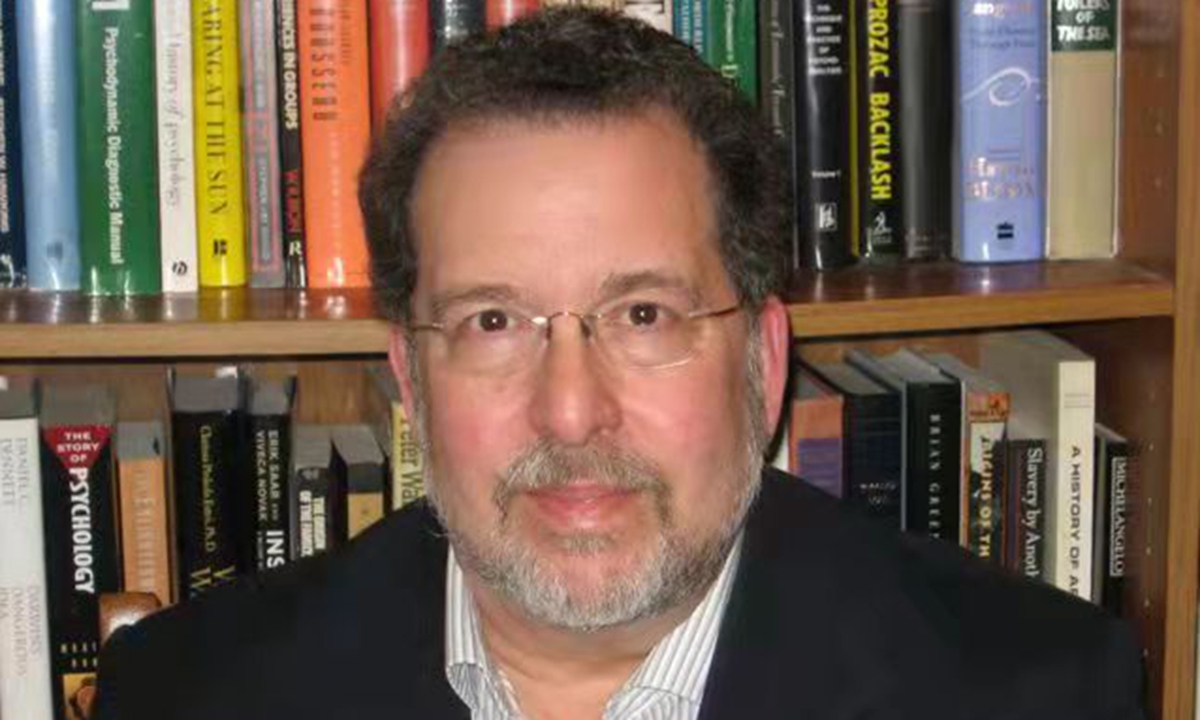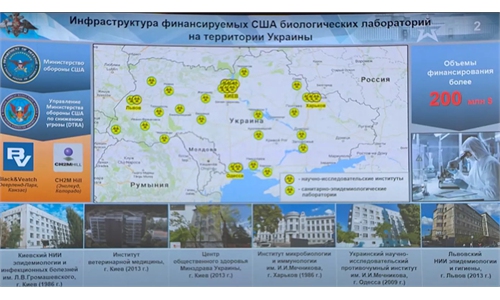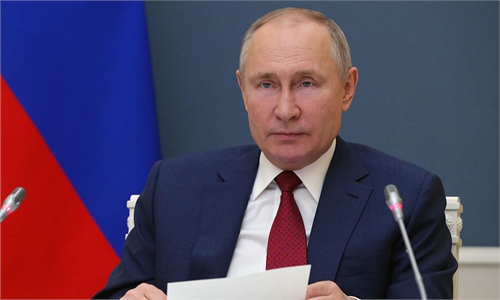
Jeffrey Kaye Photo: Courtesy of Kaye
Editor's Note:There have been an increasing number of doubts and questions over the US Fort Detrick and the more than 300 overseas biolabs. Jeffrey Kaye (Kaye), a former clinical psychologist in San Francisco who spent years researching US biological warfare during the Korean War, called upon the US to provide the documentation and publicize what's really being done. Kaye said that we need "more open records, exposure, and a true and believable investigation." The following is a full transcript of the interview between Kaye and Global Times (GT) reporter Yu Jincui.
GT: After you reviewed documents declassified by CIA, what have you found? Is there enough evidence to prove that the US conducted germ warfare during the Korean War?
Kaye: Instinctively, I am 100 percent sure the US engaged in germ warfare during the Korean War. Viewed from the angle of basic evidentiary standards, I'd say based on the evidence from hundreds of eyewitnesses given to different investigators over the years, the uncensored portions of Defense Department documents available from the US, and now the two dozen descriptions in CIA documents of communications intercepted during the Korean War from units of the Korean People's Army and Chinese People's Volunteer Army, and the contemporary statements of US Air Force and Marine Corps officers about the operations of the germ war, that the preponderance of the evidence, that is, over 50 percent of the evidence points to the truth of the germ warfare allegations. Some US academics have claimed they unearthed documents that show the Korean War evidence was a "hoax" perpetrated by Russia, China and North Korea. But those documents have never been seen in their original, and the claims within the documents are easily disconfirmed, as I've demonstrated on a number of occasions.
GT: The Japanese Unit 731's biological warfare research program is infamous to China as the majority of the victims were Chinese. The US also used biological weapons during the Korean War. But why, until recent years, was the US use of bioweapons in the Korean War confirmed by documents declassified by the CIA?
Kaye: The CIA in 2010, the 60th anniversary of the beginning of the Korean War, decided to declassify hundreds of different communications intelligence reports, and other materials that it had in its archives. These were very highly top-secret documents. I found approximately two dozen that referenced the use of biological warfare. There are a lot of complaints by CIA analysts about propaganda from the Soviet Union or China or North Korea. But what finally struck my eye was the declassification of reports that were referenced in the radio intercepts and decoded by cryptanalysts working for the United States Army. It's something called the Armed Forces Security Agency, which later became the NSA which we know of today as the National Security Agency.
There are numerous instances which I've taken from those documents and published online for people to read, in which military units reported to their commanders they'd been attacked by bacteriological weapons, they needed DDT to help kill the insects that were infected, and their supply chain was all screwed up because they couldn't move because of biological weapons attacks, and so on. So these people weren't faking it. They didn't know that they were being overheard by US Army people listening in. This was real evidence that, in fact, the attacks were taking place. And the evidence was taken in real-time.
Why did it take so long to release them? Because so much of the materials during the Korean War period were classified and still remain classified. The US is a very secretive government.
GT: According to documents declassified by the CIA, the US applied Unit 731-inspired bioweapons during the Korean War. You suggested that the international community should establish an international commission to investigate, but why is it so hard to push an investigation?What are the obstacles?
Kaye: The materials used by the United States when they used biological weapons were very similar to those used by Unit 731. I don't know whether they were exactly the same. Unfortunately, there are some dots there that I can't connect because the documents are classified. But it's obvious to anybody who knows the history of it that's most likely what occurred.
For instance, an internal document from the US Army's Chemical Corps in 1953 referenced the "limited war" in Korea and temporary measures involving bioweapons. I believe these were the Unit 731-type weapons, like the feather bomb, the US used in their germ war campaign, weapons utilizing insects and biowar sabotage, such as used by Unit 731 against China in World War II. These were "stop-gap" because more sophisticated weapons the US Army and Air Force were working on were not ready for use by 1951, 1952. It was essentially a kind of large-scale field testing or experiment using methods they had inherited from their agreement with Unit 731 and Shiro Ishii after World War II.
How come it's so hard to get the investigation? Or how hard is it to get people interested? Part of that is the legacy of the cold war, which continues the hostility of the US government and other Western governments to anyone who would expose their crimes. One can look to see what happened to Julian Assange, who did that in Iraq and today still sits in a British prison fighting extradition.
I don't know how to explain it to people. It's quite shocking. It's almost like a totalitarian kind of government that has penetrated the academic community to a large extent and they control the media.
People are afraid that their careers will be spoiled if they push this material. So instead, they don't say anything. Behind the scenes, I've seen that numerous times it's just that people are afraid to act on it. It's quite sad.
GT: There have been lots of doubts and questions over the US Fort Detrick and overseas biolabs around the world, especially in the commonwealth of independent countries around Russia. The US has 336 biolabs in 30 countries. What has the US done in those labs? Does it act in compliance with the Biological Weapons Convention? Are you concerned about it?
Kaye: There are a number of people who are concerned that the Biological Weapons Convention is being violated by the United States and possibly by other countries as well. A lot of secrecy goes into these labs - the destruction of the documents of the Ukraine labs which are taken away or removed or destroyed. No one can read them now, because they're not there.
I know that they say that they are mostly there to work with countries in determining surveillance of existing biological threats, not from other countries per se, but just in nature, but also perhaps from biological weapons attacks from other countries, they claim. But in fact, everyone who's ever looked very deeply or even a little bit into the biological weapons program of the US and other countries recognizes that there's an extremely thin line between what's done for defensive purposes, such as the surveillance of biological pathogens out in the world, and actually using such methods for offensive purposes.
And in fact, I found when I was researching about the Korean War, more than one instance in which there were admissions made that they were hiding biological weapons research behind the so-called defensive biological weapons. As early as 1948, the Chairman of the U.S. Army Chemical Corps Advisory Board told the board that the work on offensive use of insect vectors to deliver biological agents was being hidden behind defensive work on "insect control."
So we can't know as we can't see, but we do know what the United States has been fighting against. The US for a long time has been fighting against the establishment of a verification mechanism for the Biological Warfare Convention so that there are no actual teeth to that treaty: If you're a bad actor, you can do whatever you want. You're not going to get called out on it. It's at least a good thing that this is finally coming out into the open, because there's a lot that people don't know about this, and we need to have investigations.
GT: White House officials are giving confusing information over the US biolabs in Ukraine. Based on your experience and observation, what purposes do you think the US biolabs in Ukraine are for? In order to convince the world, what does the US need to do?
Kaye: The US needs to open up to provide the documentation and open up to what's really being done in those labs. But the problem is, they're not going to do that. I think they need to open up about the whole truth of the biological warfare program that the US has had going back 70, 80 years now, because you can't understand what's happening in the labs unless you understand the history of the US biological warfare program, its secrecy, its connections with the CIA, and its connections with academia. Instead, what you hear in the US press is a lot of bad-mouthing of Russia because they accused the US of using birds to possibly spread biological pathogens.
The US has long had programs, particularly in the 1960s and 70s, researching bird migration patterns and pathogens and reporting to Fort Detrick as part of the biological warfare program. That's history. But if you don't know the history, you wouldn't know that they were lying. So what does the US need to do? It needs to open up all its archives. And we need to declassify the records going back all the way to the end of WWII, the Korean War, the Vietnam War and so on. so that we can see what are they doing in these hundreds of biolabs.
GT: Why has the US repeatedly refused requests by the international community for access to its biolabs overseas, including the ones in Ukraine? What are they worried about or afraid of?
Kaye: I think what they're afraid of is that it will be shown that they're in violation of the Biological Weapons Convention, and that a covert biological warfare program is, in fact, underway and has been underway for some time.
It was back in the late 1940s that the US government decided that it would make highly secret all the research that was being done about biological weapons, and that secrecy is maintained today. It's very difficult to get so many important documents that are classified and go back 70 years or more. What are they hiding? As I've looked into the biolabs a little bit, it seems possibly they're hiding the use of biological weapons. I'm still trying to gather the information, but my take is that there's a covert program going on.
GT: Let's talk about the Fort Detrick. You once mentioned in an interview that Fort Detrick was and still is at the center of US biological warfare research. Why did US public keep silent over this?
Kaye: The US public, I think, keeps silent because they don't really know everything that's going on there, and they've been told lies, or they just don't want to know. It's basic human psychology that people want to believe that their own government is good, or at least ok and not doing evil or terrible crimes.
There's a certain passivity. And the culture of the US is that it encourages that passivity. Fort Detrick has been, for many years, the heart of US biological warfare research. There are other areas and other places like Dugway Proving Ground in Utah that are associated with the US biological work program.
And there are also these biolabs now, which may or may not be associated with that program. Fort Detrick is the center and everything there is kept secret. It's been a culture of secrecy that goes back now three or four generations. So you get a sense. It's hard to break something like that when the whole political culture acts to reinforce it.
GT: Evidence has proven the US use of bioweapons during the Korean War. With such a bad record, what are your suggestions for the international community to organize investigations into the US biolabs and biological activities around the world?
Kaye: First, we need exposure. People don't have the information. They're not going to act or put pressure on their own governments until the information is out there. And I've been trying to do it, but I'm just one person. I'm a retired psychologist who's trying to publicize this material and get it out into the public realm.
There's no reason to hold anything secret, to hold back on things that happened decades ago, unless it is embarrassment over the exposure of war crimes. Release everything from the Korean War, release everything from the Vietnam War, period. Japan, in particular, has probably been the worst. They're in a state of denial over their use of biological weapons in their Unit 731. The United States is almost as bad. They certainly deny that they use bio-weaponry and for many years helped to cover up their alliance with the Japanese biological warfare unit. So exposure is, what I would have to say, first. The world is in a difficult place. We need some kind of investigation of these war crimes.
When China was looking for someone to investigate the US bacterial warfare in China in 1952, they helped form an international scientific commission, which included representatives from other countries around the world. They weren't associated with any other international organization like the UN and they went and included reputable scientists from around the world, led by a very famous British scientist, Joseph Needham, who later became a historian of Chinese science.
And we need that level of authority so that the world can trust what they find. And then we need to open up and expose this. So that's what we need, more open records, exposure, and then a true and believable investigation.
GT: As a historian, how do you define the differences between biological weapons, chemical weapons and nuclear weapons? The US is the only country to have used all three weapons (chemical weapons in the Vietnam War, biological weapons in the Korean War, and nuclear weapons in World War II). How should we define such actions by the US?
Kaye: The use of some kind of biological weaponry and disease or poisoning wells and things like this goes way back in history. But in modern times, the first known use was by Germany in World War 1. At that time, Germany used glanders and pathogens to attack enemy livestock, such as horses and sheep. The first large-scale use of BW against humans was by Japan, which used bacteria as weapons from the late 1930s into the 1940s through Unit 731 and associated military units. And then later, the US government did it during the Korean War. The US has also been charged with using biological weapons against Cuba and East Germany.
Obviously, these were criminal uses, whether we're talking about the use of nuclear weapons against Japan, or the use of biological weapons against Korea, China, Cuba, East Germany, among others. We know about the use of Agent Orange in Vietnam.
They're all terrible weapons. Nuclear weapons are the most dangerous because they can end life as we know it on this planet. The other weapons are also terrible. Even though the bulk of my work is about pointing out the crimes around biological warfare, all of them are dangerous. The United States has shown a dangerous propensity to use these weapons. It's very frightening. I think many people in the world are scared today that they'll do it again.


